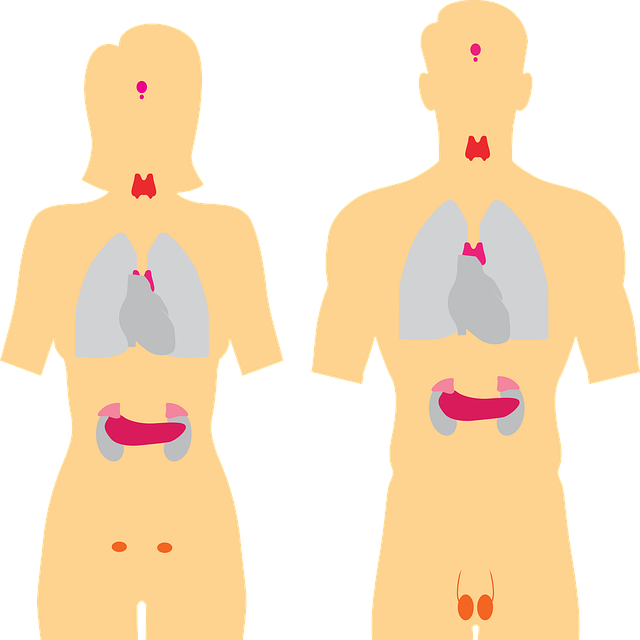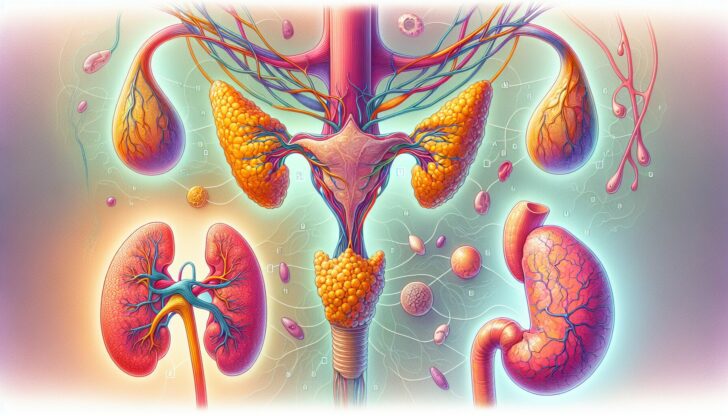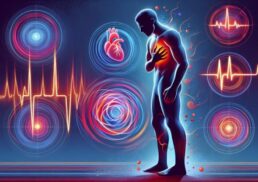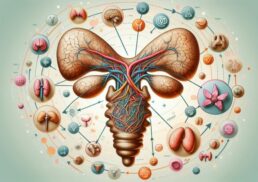The endocrine system uses hormones to regulate growth, metabolism, and reproduction. This article will explain how it works, detail the functions of each gland, and offer tips for maintaining hormonal balance.
Table of Contents
Key Takeaways
The endocrine system comprises specialized glands that produce hormones, regulating key bodily functions such as growth, metabolism, and reproduction.
Imbalances in hormone levels can lead to various health issues, including diabetes and thyroid disorders, highlighting the importance of understanding and monitoring endocrine health.
Maintaining a healthy endocrine system involves regular exercise, a balanced diet, stress management, and sufficient sleep to support hormonal balance and overall well-being.
Understanding the Endocrine System

The endocrine systems consist of specialized glands that produce and release hormones into the bloodstream. These hormones act as chemical messengers, traveling to target organs and tissues to regulate various functions, including growth, metabolism, and reproduction. Unlike the nervous system, which uses electrical signals for rapid communication, the endocrine systems rely on these slower, yet highly effective, chemical signals.
Endocrine glands, such as the pituitary gland, thyroid gland, and adrenal glands, play pivotal roles in maintaining homeostasis. Hormones control key processes like energy utilization, electrolyte balance, and stress response.
However, when hormone levels become imbalanced, it can lead to a variety of health issues. Understanding the functions of these hormone-producing glands helps recognize potential disorders and maintain overall health.
Key Endocrine Glands and Their Functions

The human body features several major glands, including the pineal gland, pituitary gland, pancreas, ovaries, thyroid gland, parathyroid glands, hypothalamus, and adrenal glands. Each gland plays a significant role in the endocrine system by producing specific hormones that regulate various physiological and behavioral processes.
The intricate network of these endocrine glands ensures that our bodies respond appropriately to internal and external stimuli. From managing stress to regulating metabolism, these glands and their hormones play a crucial role in keeping the endocrine system healthy and balanced.
Here are the functions of each of these key glands.
Hypothalamus
The hypothalamus serves as a critical link between the endocrine system and the nervous system, primarily through its connection to the pituitary gland. Located in the brain and nervous system, this small but mighty gland regulates hormone secretion from the anterior pituitary, influencing various bodily functions such as temperature regulation, thirst, and hunger.
One of the hypothalamus’s key roles is to release hormones that control the secretion of other hormones from the pituitary gland. For instance, corticotropin-releasing hormone (CRH) from the hypothalamus initiates the hypothalamic-pituitary-adrenal (HPA) axis, which is crucial for the stress response.
The hypothalamus also plays a significant role in regulating the autonomic nervous system, impacting overall health and homeostasis.
Pituitary Gland
Often referred to as the “master gland,” the pituitary gland is about the size of a small marble and is located directly beneath the hypothalamus. It plays a pivotal role in regulating various endocrine functions by producing a range of critical hormones. The anterior pituitary secretes hormones such as adrenocorticotropic hormone (ACTH), thyroid-stimulating hormone (TSH), growth hormone (GH), and reproductive hormones like luteinizing hormone (LH) and follicle-stimulating hormone (FSH).
The posterior pituitary, on the other hand, stores and releases hormones produced by the hypothalamus, such as vasopressin and oxytocin. Growth hormone, for example, is essential for growth and development and plays a role in metabolism by increasing blood sugar levels and enhancing amino acid uptake.
The pituitary gland’s ability to regulate such a diverse range of bodily functions underscores its importance in the endocrine system.
Thyroid Gland
The thyroid gland, located in front of the trachea and just below the larynx, produces hormones that are crucial for regulating metabolism. The primary hormones produced by the thyroid gland are thyroxine (T4) and triiodothyronine (T3), which significantly influence the metabolic rate of almost all body cells. These hormones are regulated by thyroid-stimulating hormone (TSH) from the pituitary gland.
The hypothalamic-pituitary-thyroid (HPT) axis is a feedback loop that ensures hormone levels remain balanced. T4 and T3 increase the metabolism of body tissues, and their levels are monitored by the hypothalamus and pituitary gland.
Additionally, the thyroid gland produces calcitonin, a hormone that helps lower blood calcium levels.
Parathyroid Glands
The parathyroid glands are small, pea-sized glands located in the neck behind the thyroid gland. Despite their size, they play a crucial role in regulating calcium levels in the blood by producing parathyroid hormone (PTH). When blood calcium levels drop, the parathyroid glands release PTH to increase calcium levels by stimulating bone resorption, increasing calcium absorption in the intestines, and reducing calcium excretion in the urine.
This finely tuned mechanism ensures that calcium levels remain within a narrow range, which is vital for proper muscle function, nerve transmission, and bone health. The balance maintained by the parathyroid glands is essential for overall health and well-being.
Adrenal Glands
The adrenal glands, located on top of each kidney, are composed of an outer cortex and an inner medulla. The adrenal cortex produces corticosteroids, including glucocorticoids and mineralocorticoids, which are involved in various body functions such as stress response, metabolism, and immune system regulation. Adrenocorticotropic hormone (ACTH) from the pituitary gland stimulates the adrenal cortex to produce these essential hormones.
The adrenal medulla, on the other hand, secretes adrenaline (epinephrine), which is vital for the body’s immediate stress response. This hormone, an amino acid derivative, prepares the body for ‘fight or flight’ reactions by increasing heart rate, blood pressure, and energy availability.
The dual functionality of the adrenal glands makes them crucial for both short-term and long-term stress management.
Pancreas
The pancreas serves a dual role as both an endocrine and exocrine gland. Its endocrine function involves the regulation of blood sugar levels through the production of insulin and glucagon. Insulin, produced by the beta cells of the Islets of Langerhans, lowers blood glucose levels by facilitating glucose uptake into cells for energy storage. Conversely, glucagon, produced by the alpha cells, increases blood glucose levels by promoting glycogen breakdown and gluconeogenesis.
Blood sugar regulation is a critical function of the pancreas, ensuring that our energy levels remain stable throughout the day. The balance between insulin and glucagon release is essential for maintaining healthy blood sugar levels and preventing disorders such as diabetes mellitus.
Gonads
The gonads, which include the ovaries in females and the testes in males, are responsible for producing sex hormones that influence sexual development and reproductive functions, including the proper functioning of the reproductive organs. The ovaries produce estrogen and progesterone, which regulate the menstrual cycle and support pregnancy. The testes produce testosterone, which is essential for sperm production and the development of male secondary sexual characteristics.
These hormones play a critical role in growth and development, influencing everything from body composition to mood and behavior. Maintaining a balance in sex hormone levels is crucial for reproductive health and overall well-being.
Hormones and Their Mechanisms
Hormones can be classified into several categories based on their structure and function. These include steroids, amino acid derivatives, and peptide hormones. Each type of hormone has a unique mode of action and plays a specific role in regulating bodily functions. Understanding these mechanisms is key to appreciating how hormones control various physiological processes.
Hormones are either water-soluble or lipid-soluble, which determines how they interact with their target cells. For example, water-soluble hormones like insulin interact with receptors on the cell surface, while lipid-soluble hormones like steroids enter the cell to influence gene expression directly. This diverse range of hormone mechanisms ensures that our bodies can respond appropriately to a wide array of internal and external stimuli.
Steroid Hormones
Steroid hormones are lipid-soluble, allowing them to pass through the cell membrane and enter their target cells directly. Once inside, they bind to receptors in the cell’s nucleus, influencing gene expression and altering cellular function. This mechanism enables steroid hormones to regulate complex processes such as metabolism, immune response, and reproductive functions.
Examples of steroid hormones include cortisol, which is produced by the adrenal cortex and helps manage stress, and sex hormones like estrogen and testosterone, which are critical for reproductive health and secondary sexual characteristics.
Steroid hormones’ capacity to modulate gene expression makes them powerful regulators of numerous physiological processes.
Peptide Hormones
Peptide hormones, which include proteins and polypeptides, interact with receptors on the cell surface. This interaction triggers a cascade of internal changes within the cell, often involving secondary messengers that amplify the hormone’s signal. This mechanism allows peptide hormones to exert their effects quickly and efficiently.
One notable example of a peptide hormone is insulin, which regulates blood sugar levels by promoting glucose uptake into cells. Another example is growth hormone, which stimulates growth and cell reproduction.
Peptide hormones’ rapid and specific actions are essential for maintaining various physiological processes.
Amino Acid Derivatives
Amino acid derivative hormones are synthesized from amino acids and play vital roles in various bodily functions. A prime example is adrenaline, produced in the adrenal medulla, which is crucial for the body’s stress response. During stressful situations, adrenaline increases heart rate, blood pressure, and energy availability, preparing the body for ‘fight or flight’ reactions.
These hormones also influence metabolic processes, ensuring that the body can adapt to changing conditions. The diverse roles of amino acid derivative hormones highlight their importance in maintaining homeostasis and responding to external stimuli.
Maintaining a Healthy Endocrine System

Maintaining a healthy endocrine system is crucial for overall well-being. Regular physical activity, proper nutrition, and adequate sleep are essential for supporting hormonal health. Exercise increases the sensitivity of hormone receptors, aiding nutrient delivery and improving insulin resistance. A balanced diet rich in whole foods provides the necessary nutrients for hormone production and regulation.
Stress management is also vital, as chronic stress can elevate cortisol levels, leading to various health issues. Techniques such as meditation and mindfulness can help mitigate these effects. Additionally, ensuring at least 7 hours of quality sleep each night supports hormonal balance and overall health.
Adopting these healthy lifestyle habits helps keep the endocrine system functioning optimally.
Common Endocrine Disorders
Endocrine disorders arise when hormone levels become imbalanced, leading to various health issues. Common symptoms include fatigue, unexplained weight fluctuations, and mood changes. Environmental chemicals known as endocrine disruptors can also interfere with normal hormone function, exacerbating these problems.
Timely consultation with an endocrinologist is crucial for diagnosing and managing these disorders. Early detection and treatment can significantly improve quality of life and prevent further complications. Recognizing common endocrine disorders helps in seeking appropriate medical care.
Diabetes Mellitus
Diabetes mellitus is a common endocrine disorder that results from disturbances in the regulation of blood sugar levels. Insulin and glucagon, produced by the pancreas, are key hormones in blood glucose management. Insulin lowers blood sugar levels by facilitating glucose uptake into cells, while glucagon raises blood sugar levels by promoting glycogen breakdown and gluconeogenesis.
When the balance between insulin and glucagon is disrupted, it can lead to conditions like diabetes mellitus. This disorder can manifest as either Type 1, where the body fails to produce insulin, or Type 2, where the body cannot use insulin effectively.
Effective management of diabetes involves regular monitoring of blood sugar levels, maintaining a healthy diet, and adhering to prescribed medications or insulin therapy.
Learn more, Diabetes Mellitus type 2.
Thyroid Disorders
Thyroid disorders, such as hyperthyroidism and hypothyroidism, result from imbalances in thyroid hormone production. Hyperthyroidism occurs when the thyroid gland produces excessive hormones, leading to symptoms like rapid heartbeat, weight loss, and increased sweating. Grave’s disease, an autoimmune disorder, is a common cause of hyperthyroidism.
On the other hand, hypothyroidism is characterized by insufficient thyroid hormone production, resulting in fatigue, weight gain, and developmental issues in children. Balancing thyroid hormones is crucial for overall health due to the thyroid gland’s role in metabolism regulation.
Thyroid-stimulating hormone (TSH) from the pituitary gland helps regulate thyroid hormone levels, ensuring they remain within a healthy range.
Adrenal Insufficiency
Adrenal insufficiency occurs when the adrenal glands fail to produce sufficient corticosteroid hormones. This condition can lead to serious health issues if not managed properly. Addison’s disease, a specific type of adrenal insufficiency, is characterized by low cortisol levels, which can result in fatigue, low blood pressure, and muscle weakness.
The adrenal cortex’s inability to produce adequate corticosteroids in Addison’s disease underscores the importance of these hormones in managing stress and maintaining metabolic functions. Treatment typically involves hormone replacement therapy to restore normal hormone levels and alleviate symptoms.
Multiple Endocrine Neoplasia
Multiple Endocrine Neoplasia (MEN) is a genetic disorder that leads to the development of tumors in various endocrine glands. There are two primary types, MEN 1 and MEN 2, each affecting different glands and presenting distinct symptoms. MEN 1 commonly involves tumors in the pituitary gland, parathyroid glands, and pancreas, while MEN 2 often affects the thyroid gland and adrenal glands.
Early detection and management of MEN are crucial for preventing complications and improving quality of life. Regular screening and genetic testing can help identify individuals at risk, allowing for timely intervention and treatment.
When to Consult a Doctor
Recognizing the symptoms of endocrine disorders ensures timely medical intervention. Symptoms such as unexplained weight changes, persistent fatigue, or mood swings may indicate an underlying hormonal imbalance.
Diabetes, the most frequently diagnosed endocrine disorder in the United States, exemplifies the importance of early diagnosis and management. Consulting a doctor promptly for any concerning symptoms can lead to effective treatment and improved health outcomes.
Summary
In conclusion, the endocrine system plays a vital role in regulating numerous bodily functions through the production and release of hormones. Understanding the functions of key endocrine glands, such as the pituitary gland, thyroid gland, and adrenal glands, is essential for recognizing the importance of hormonal balance in maintaining health. Disorders like diabetes mellitus, thyroid imbalances, and adrenal insufficiency highlight the potential consequences of hormonal dysregulation.
By adopting healthy lifestyle habits, such as regular exercise, proper nutrition, and stress management, we can support the endocrine system and promote overall well-being. Early recognition of symptoms and timely consultation with healthcare professionals can lead to effective management and improved quality of life. Prioritizing endocrine health ensures that our body’s orchestra continues to perform harmoniously.
Frequently Asked Questions
What is the best definition of endocrine system?
The endocrine system is a complex network of glands and organs that produce hormones, regulating vital body functions like metabolism, growth, reproduction, and stress response. It plays a critical role in maintaining overall bodily functions through these hormonal signals.
What is the endocrine function and organ?
The endocrine function involves the release of hormones into the bloodstream by endocrine glands, which regulate various bodily processes such as mood, growth, metabolism, and reproduction. This system is crucial for maintaining homeostasis throughout a person’s life.
What are the 7 major organs of the endocrine system?
The seven major organs of the endocrine system are the hypothalamus, pituitary gland, thyroid gland, parathyroid glands, adrenal glands, pineal body, and pancreas. Additionally, in females, the ovaries and, during pregnancy, the placenta play a crucial role.
What are 3 main functions of the endocrine system?
The endocrine system primarily makes hormones that regulate mood, development, and growth, sends these hormones into the bloodstream, and controls their release to maintain balance in the body. Understanding these functions highlights the system’s crucial role in overall health.
What are the main functions of the endocrine system?
The endocrine system primarily regulates growth, metabolism, and reproduction through hormone production and release, ensuring proper functioning of various bodily processes.









